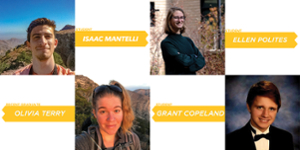Kaszuba Research Group Presents at AGU Conference in New Orleans
Published February 02, 2022

Four members of the Kaszuba research group in the Geology and Geophysics Department presented at the American Geophysical Union (AGU) Fall Meeting in New Orleans in December.
The AGU Fall Meeting is the most influential event in the world dedicated to the advancement of earth and space sciences. The conference attracts more than 25,000 attendees from over 100 countries to share research and network.
UW graduate students Ellen Polites of York, Pa., Grant Copeland of Norfolk, Va., and Isaac Mantelli of Herdon, Va. presented their research projects along with recent graduate, Olivia Terry of Tulsa, Ok. The students are or have completed advanced degrees under the supervision of School of Energy Resources (SER) Professor of Geology and Geophysics, John Kaszuba.
“Ellen, Grant, Isaac, and Olivia worked exceptionally hard to produce quality research,” says Kaszuba. “It’s a notable accomplishment for these four students to present their research on the international stage of the AGU Fall Meeting. I am proud of all of them.”
Kaszuba is the John and Jane Wold Centennial Chair in Energy and a renowned expert in geochemical fluid-rock interactions, geologic carbon sequestration, and petroleum systems. His lab attracts high caliber students from all of the U.S. where he oversees work on a wide variety of projects.
The AGU Fall Meeting allowed his students to showcase their work.
Ellen Polites is pursuing her master’s degree with a research emphasis on carbon sequestration. At AGU, Polites presented two informative sessions. One of her talks detailed work she conducted during an internship with Pacific Northwest National Lab (PNNL) on carbonate mineralization occurrences from CO2 injections into basalt, and the other discussed work she carried out as part of SER’s Wyoming CarbonSAFE Project looking at the fate of mobilized metals in a leakage scenario using the Mowry Shale.
Polites’ exceptional work is in high demand. She presented posters featuring earlier stages of her projects to both the Wyoming legislative Joint Minerals Committee, as well as at the Petroleum Association of Wyoming (PAWS) annual meeting in the fall.
“I am always excited to share my carbon sequestration and storage work,” says Polites. “Presenting my science allows me to reach a broader audience and receive feedback from other researchers around the world.”
With prior experience conducting reservoir property modelling and simulation for carbon sequestration in the Powder River Basin (PRB), Grant Copeland presented a poster at AGU on a related project. He demonstrated the way in which chemical reactions and fluid flow are conventionally modelled and understood, and how they do not apply to porous systems where pore diameters are below a certain threshold (nano-porosity).
Copeland received his bachelors degree in geology from Auburn University in 2018 with a concentration on structural geology. His studies included a 3-month field course in the Scottish Highlands. Shifting his focus to geochemistry, he graduated from UW in 2021 with his masters in geology and geophysics. He is currently pursuing a Ph.D. under Kaszuba.
“Attending the conference allowed me to share my work on building the bridge between architected geologic analogues and subsurface systems,” comments Copeland. “It also provided me with the opportunity to connect and network with other researchers in my field of study.”
Isaac Mantelli is a master candidate in geology and geophysics. He presented a poster at the conference about the preliminary work needed to minimize the reactive surface area of a sample. His topic of interest plays a foundational role in upcoming experiments he will conduct in the lab analyzing the fluid chemistry of epoxies reacting at high pressure and high temperature.
“AGU has been one of the best opportunities I have had yet during my graduate career to explore a multidisciplinary approach to my own research, and helping me to understand the extent of the impact my work may have across scientific communities,” he says.
Mantelli completed his undergraduate degree in 2020 from the College of William & Mary with a research background in deep-time paleoclimatology and environmental geochemistry.
Rounding out the group, recent graduate Oliva Terry gave a presentation on the impacts of alkaline fracturing fluid on low-permeability, carbonate-rich reservoir rocks.
Terry is an associate geologist with ConocoPhillips in the Permian Basin. She earned her B.A. in geology in 2018 and her M.A. in 2020, both from the University of Wyoming. While studying under the tutelage of Professor Kaszuba, she discovered a passion for geochemistry in the hydrothermal lab and later focused her research on mineral reactions between alkaline fracturing fluid and the Niobrara Formation.
“AGU is a great opportunity to meet with collaborators, view new research methods, and explore a wide range of geology-based disciplines,” says Terry. “I was honored to be a part of the meeting and reconnect with friends and colleagues from the University of Wyoming.”
“As a faculty member of SER and the Department of Geology and Geophysics at the University of Wyoming, it is gratifying to mentor students who produce such fine work,” adds Kaszuba. “Their research and development efforts not only advance the state of the science, their work ultimately benefits the people of the State of Wyoming.”
SER is pleased to share some involvement with the success of the students. Dedicated to promoting energy related solutions throughout campus in varying disciplines, the Kaszuba research group exemplifies the interdisciplinary and collaborative energy education at UW.
“Each year the School of Energy Resources provides student support funding for students to pursue energy related studies” says SER senior director of research Scott Quillinan. “We are so pleased that we can help support exceptional students share their research, which is both relevant to Wyoming and is expanding areas of inquiry that are important for current energy challenges. We are grateful to Dr. Kaszuba for all that he does to help these bright minds excel.” The next AGU meeting will be held in Chicago in December 2022.

